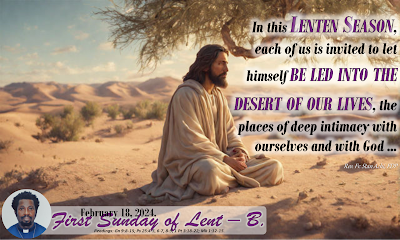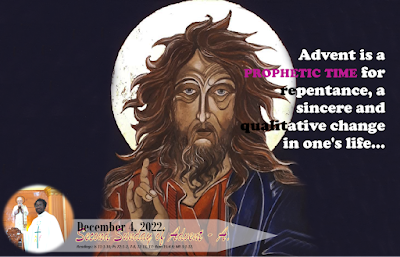DESERT, TEMPTATIONS, FAITHFULNESS TO THE COVENANT OF LOVE, AND FREEDOM.
February 18, 2024.
First Sunday of Lent – B.
Readings: Gn 9:8-15; Ps 25:4-5, 6-7, 8-9; 1 Pt 3:18-22; Mk1:12-15.
“The Spirit drove Jesus out into the desert, and he remained
in the desert for forty days, tempted by Satan.” (Mk 1:12)
An Arabic proverb says: “In the desert of life the wise
person travels by caravan, while the fool prefers to travel alone.” A Bambara
proverb adds: “The greatest crime in a desert is to find water and keep silent
about it.”
In each one's life, there are moments when we are put to the
test. We are tempted, sometimes, even beyond our capacity for resistance. All
the temptations we go through are a test of our ability to keep faithful to our
promises and covenants. No one is exempted from temptations. Even Jesus, the
Messiah, the Son of God, was not exempt from temptation. The capacity to resist
and keep faithfulness in front of temptations is what determines our love. He
who truly loves, endures, and resists.
Besides, without temptation, we cannot judge someone's
faithfulness. Temptations, therefore, become the key and the tool of
evaluation.
In this Lenten Season, each of us is invited to let himself
be led into the desert of our lives, the places of deep intimacy with ourselves
and with God, and be evaluated on how we keep faith in God, mostly in the
moments of trials and tribulations.
Pope Francis, for this Lent 2024 gave a beautiful message
titled: "Through the Desert, God Leads us to Freedom."
The desert is a place of solitude and reflection on oneself.
It is also a place of encounter, encounter with God, and encounter with
oneself. The most beautiful is that the desert is a place where one learns to
be free. Through the experience of the desert, we become free from material
possessions and accumulation, free from the spirit of the world made of
consumerism, free from presumption and preconceived ideas, free from gossip,
hatred, jealousy, and everything that loads our lives in the ordinary of our
days. Though, truly, deserts are not a pleasing place, the experience of the
desert is the most formative one needs to reach any form of maturity, even
spiritual. The Holy Father, after running through the experience of the
children of Israel in the desert and many other expressions of the desert as
the place to be for prayer, intimacy, and communion, affirms: "The desert
is the place where our freedom can mature in a personal decision not to fall
back into slavery." That is exactly what we are called for, during this
Lenten pilgrimage, to decide to not be slaves of sin, not be slaves of material
possessions, not be slaves of the self and its desires, but rather, to open a
way to genuine and sacrificial love.
In our first reading, we hear about God's covenant with Noah
and his children after the flood that wiped away from the earth all evil and
all evildoers. The Lord promises that never again will his wrath rise to
destroy the earth. As a sign, he gave the rainbow, an bow, of love, harmony,
and peace. The image of the covenant is perfect here.
The Gospel speaks of the experience of the Lord Jesus in the
desert. It was for him a place of temptations, but also a place of faithfulness
to his Father.
Mark states that Jesus was tempted by Satan, and the angels
ministered to him. After this experience of the desert, the Lord started his
public ministry, a mission that will lead him up to the Calvary and his death
and Resurrection.
In this Lenten Season, we have embarked with him on this
journey. We are invited to go with him in the deserts of our life, face
temptations, fight sin, die of our sins, and with him, rise unto a newness of
life. This journey of dying with the Lord and rising again with him, we already
did it in our Baptism. But because we are still in the journey of purification
and toward perfection, the Lenten Season comes to remind us of the need for
daily and continual conversion. St. Peter, in his pastoral letter, presents the
reality of Baptism as a new birth after death. In the words of the Apostle,
this sacramental birth was prefigured by the flood, at the time of Noah. Just
as the flood was for purification, so too, the Baptism plunges us into the
death of Christ, purifies us, and regenerates us unto new life.





Comments
Post a Comment